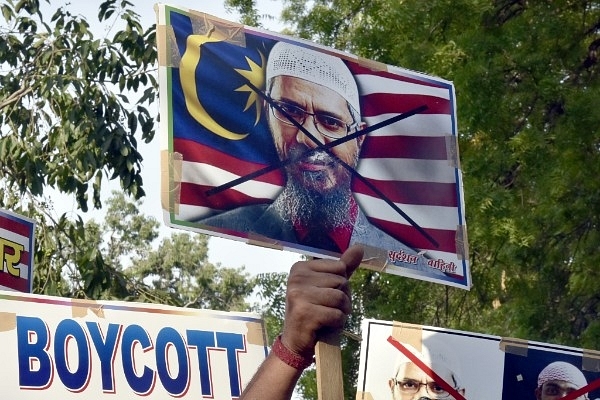
How India Can Coerce Malaysia Into Handing Over Zakir Naik
The Naik deportation case is the third instance where Malaysia has refused to cooperate with India. So, New Delhi must do all it could to bring the controversial preacher back to India.
Last week, Malaysian Prime Minister Mahathir Mohamad rubbed salt to Indian wounds by meeting controversial Islamic preacher Zakir Naik, who is wanted by the Enforcement Directorate for money laundering and spreading terror. Mohamad met Naik after stating that the preacher would not be deported to India unless he causes trouble. The development is much against what the then Malaysian Home Minister Ahmad Zahid Hamidi said last year. He said Malaysia would fulfil any request made by India and deport Naik if an application on the basis of mutual legal assistance was made.
This is the third instance of Malaysia refusing to cooperate with India on a crucial case. First was in the Bofors case when India sought the extradition of one of the prime suspects, Ottavio Quattrocchi. The first time, India lost a long, protracted legal battle in 2003-04 when the Malaysian courts held the charges against the Italian untenable. Quattrocchi died in July 2013, burying the truth in the Rs 64 crore Bofors case forever.
The second one is the non-cooperation by the Malaysian authorities in helping the Indian government question billionaire and business tycoon T Ananda Krishnan in the Aircel-Maxis deal. Attorney-General K K Venugopal told the Supreme Court in March this year that investigation into the Aircel-Maxis deal was pending as Indian authorities had been unable to bring Krishnan, an influential person in Malaysia, to India to face trial. A letter rogatory has been issued against Krishnan, but he is refusing to cooperate, while the Malaysian government is refusing to provide documents.
The Aircel-Maxis case pertains to former finance minister P Chidambaram granting Foreign Investment Promotion Board approval in March 2006 to Krishnan’s Maxis group subsidiary, Global Communication Services Holding Limited, to invest $800 million in Chennai-based telecom firm Aircel. The Central Bureau of Investigation said that only the Cabinet Committee on Economic Affairs can approve such large investments, but Chidambaram violated it and gave approval on his own accord.
And now is the third instance of Malaysia rubbing India on the wrong side. One way for India to tackle such a problem would be to hit Malaysia where it hurts the most. And that means taking a few steps, particularly on the trade front. The first step could be for India to threaten to pull out of the Malaysia-India Comprehensive Economic Cooperation Agreement signed on 18 February 2011 and brought into force on 1 July that year. It could be a source of worry for Malaysia since the trade balance is in its favour with Kuala Lumpur making up over $7.13 billion of this. Malaysia primarily exports palm oil, its byproducts, saw logs, crude petroleum, electric and electronic products, chemical and chemical products as well as metals.
Since India has signed an international agreement with Malaysia, there is a view that it would be hard for New Delhi to pull it back. But if US President Donald Trump can scrap his country’s nuclear deal with Iran or withdraw from the Paris Convention on Climate Change, why can’t the Narendra Modi government do so, citing security concerns?
India, actually, can look at a simple thing, though here too it has hurdles. It can tell Malaysia that it intends to increase the import duty on palm oil and its products. In particular, New Delhi can tell Kuala Lumpur that refined palm oil and palmolein would be mainly targeted. This is because last year, India accounted for nearly one-fourth of Malaysia’s total palm oil exports, resulting in a foreign exchange outgo of nearly Rs 9,600 crore. Malaysia also levies a 5 per cent duty on exports of crude palm oil as part of its policy to encourage refineries back home.
New Delhi can take these measures also in the name of oilseed farmers, some of whom faced tough times last year owing to a production glut and falling prices. Tariff or non-tariff barriers can certainly help them get better prices for their products such as groundnut, soybean, rapeseed and sunflower.
Touching palm oil duty isn’t easy for India though. As per its trade agreement with Malaysia, India has agreed to bind duties on palm oil to 45 per cent by December 2018. Already, duty on crude palm oil is 49 per cent, while on refined, bleached and deodorised palm oil, it is almost 60 per cent.
Though there is a view that, probably, Malaysia wants India to lower palm oil duty to hand over Naik, there are other pointers on why Mohamad may not play ball with the Modi government. Mohamad and the Gandhi family have deeper relations, with Quattrocchi being provided special treatment in Malaysia when he shifted to that country, thanks allegedly to Sonia Gandhi’s intervention. With this being the background, it is anyone’s guess if Mohamad will cow down to any pressure from India at all. But is there anything wrong in trying to do something that could benefit the country?